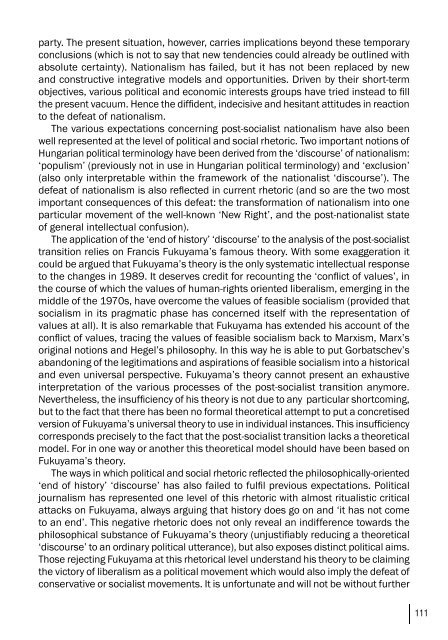art-e-conomy _ reader - marko stamenkovic
art-e-conomy _ reader - marko stamenkovic
art-e-conomy _ reader - marko stamenkovic
Create successful ePaper yourself
Turn your PDF publications into a flip-book with our unique Google optimized e-Paper software.
p<strong>art</strong>y. The present situation, however, carries implications beyond these temporary<br />
conclusions (which is not to say that new tendencies could already be outlined with<br />
absolute certainty). Nationalism has failed, but it has not been replaced by new<br />
and constructive integrative models and opportunities. Driven by their short-term<br />
objectives, various political and economic interests groups have tried instead to fill<br />
the present vacuum. Hence the diffident, indecisive and hesitant attitudes in reaction<br />
to the defeat of nationalism.<br />
The various expectations concerning post-socialist nationalism have also been<br />
well represented at the level of political and social rhetoric. Two important notions of<br />
Hungarian political terminology have been derived from the ‘discourse’ of nationalism:<br />
‘populism’ (previously not in use in Hungarian political terminology) and ‘exclusion’<br />
(also only interpretable within the framework of the nationalist ‘discourse’). The<br />
defeat of nationalism is also reflected in current rhetoric (and so are the two most<br />
important consequences of this defeat: the transformation of nationalism into one<br />
p<strong>art</strong>icular movement of the well-known ‘New Right’, and the post-nationalist state<br />
of general intellectual confusion).<br />
The application of the ‘end of history’ ‘discourse’ to the analysis of the post-socialist<br />
transition relies on Francis Fukuyama’s famous theory. With some exaggeration it<br />
could be argued that Fukuyama’s theory is the only systematic intellectual response<br />
to the changes in 1989. It deserves credit for recounting the ‘conflict of values’, in<br />
the course of which the values of human-rights oriented liberalism, emerging in the<br />
middle of the 1970s, have overcome the values of feasible socialism (provided that<br />
socialism in its pragmatic phase has concerned itself with the representation of<br />
values at all). It is also remarkable that Fukuyama has extended his account of the<br />
conflict of values, tracing the values of feasible socialism back to Marxism, Marx’s<br />
original notions and Hegel’s philosophy. In this way he is able to put Gorbatschev’s<br />
abandoning of the legitimations and aspirations of feasible socialism into a historical<br />
and even universal perspective. Fukuyama’s theory cannot present an exhaustive<br />
interpretation of the various processes of the post-socialist transition anymore.<br />
Nevertheless, the insufficiency of his theory is not due to any p<strong>art</strong>icular shortcoming,<br />
but to the fact that there has been no formal theoretical attempt to put a concretised<br />
version of Fukuyama’s universal theory to use in individual instances. This insufficiency<br />
corresponds precisely to the fact that the post-socialist transition lacks a theoretical<br />
model. For in one way or another this theoretical model should have been based on<br />
Fukuyama’s theory.<br />
The ways in which political and social rhetoric reflected the philosophically-oriented<br />
‘end of history’ ‘discourse’ has also failed to fulfil previous expectations. Political<br />
journalism has represented one level of this rhetoric with almost ritualistic critical<br />
attacks on Fukuyama, always arguing that history does go on and ‘it has not come<br />
to an end’. This negative rhetoric does not only reveal an indifference towards the<br />
philosophical substance of Fukuyama’s theory (unjustifiably reducing a theoretical<br />
‘discourse’ to an ordinary political utterance), but also exposes distinct political aims.<br />
Those rejecting Fukuyama at this rhetorical level understand his theory to be claiming<br />
the victory of liberalism as a political movement which would also imply the defeat of<br />
conservative or socialist movements. It is unfortunate and will not be without further<br />
111


